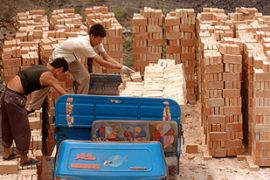China crackdown on slave labour
Promises of harsh punishment follow public uproar over slave labour scandal.

Published On 21 Jun 2007
So far about 160 owners of kilns suspected of employing slave labour have been detained in the two provinces, Xinhua state news agency said on Thursday.
The agency said a force some 45,000 policemen had raided thousands of kilns and small coal mines in Shanxi and Henan in recent days, freeing almost 600 slave labourers, including more than 50 children.
‘Murder’
|
“The problem lies with local governments where there is serious corruption” Michael Zhang, China Labour Bulletin |
The promise to crackdown on alleged slave labour followed a meeting on Wednesday of the country’s cabinet, the State Council, chaired by China’s premier, Wen Jiabao.
“Lawbreakers who illegally employ children, force people to work or maliciously injure workers will be severely punished,” the Xinhua report on the meeting quoted Wen as saying.
“The criminals are suspected not only of illegal employment practices, but also of abduction, limiting others’ freedom, employing underage workers and even murder,” it added.
The scandal was exposed partly due to an online appeal signed by a group of 400 fathers trying to locate their missing sons claiming they had been kidnapped and sold to owners of brick kilns where they were being forced to work under conditions of extreme cruelty.
‘Serious corruption’
 |
| The growing slave labour scandal has caused an uproar in Chinese media [EPA] |
Commenting on the issue, Michael Zhang, a senior researcher at the China Labour Bulletin, a Hong Kong-based labour rights group, said that many local officials failed to observe basic rights and ignored laws passed by the government in Beijing.
“The present central government has paid more attention to labour and human rights, but the problem lies with local governments where there is serious corruption,” he told Al Jazeera.
He said the existence of slave labour in China, particularly child labour, was nothing new.
“It is something the government tries to hide from the people… not even senior government officials know the extent of the problem,” he added.
Zhang said that although the promise of government action has come too late for those in Shanxi and Henan, it could serve to compel other local governments to observe labour rights.
Brick ban
Since the scandal broke, Xinhua reported that Shanxi has banned the use of cheap bricks to force illegal kilns out of business.
The ban, which takes effect at the end of 2008, requires solid clay bricks made in small kilns at very low cost to be replaced with environment-friendly cinder blocks.
In other efforts, Xinhua said that authorites in the northwestern city of Xi’an, had closed down 13 job agencies for allegedly deceiving rural workers and directing them to the illegal kilns in neighbouring Shanxi.
Source: Al Jazeera, News Agencies